I wrote this piece a few weeks ago and I've been holding onto it because there is so much sorrow in the world right now and I wasn't sure I wanted to add more. After witnessing another friend share her grief, I decided to put it out there in hopes that it might help those grieving feel less alone.
Still starting with a song — on theme for today, beautiful but sad:
Today, I cried and planted seeds. I was planning to write about a micro-backpacking trip I took a few weeks ago for my next Substack, but I’m feeling the need to write about what is in my heart right now.
This week we had a devastating few days on the road leading from our small town to my home. Between 40 and 50 people live along this road which is a 1 ½-lane paved route leading between irrigated fields dotted with horses, sheep, cows, and 25 or so houses. It’s fairly idyllic, to me at least. In the spring, milkweed blooms along the edge of the roadway, along with other wildflowers, bushes, and grasses. Every season brings new colors and delights.
An email sent last week informed town residents that “The county will be doing grading of the sand drifts and drainage ditches along the road.” The town council member described it as routine maintenance, so I expected some disruption, but what happened went far beyond what any of us imagined. Multiple huge machines went to work ripping up vegetated areas as well as mature bushes and trees. Dump trucks carted away soil and branches. This was not just happening along the existing edge of the roadway, but extending the road up to 5 feet on each side in many places.
The entire length of the road is now more prone to erosion, blowing sand and dust (which we experienced immediately during 60mph winds), and the regrowth of russian thistle, tumbleweed and other invasive and unwanted plants that thrive in disturbed areas. These fast-growing and fast-drying plants increase fire risk along the roadway, not to mention taking away from the beauty and character of our rural road. In the desert, during a drought, it will take years for these areas to recover.
I emailed the town council member who sent the original email, asking that they please consider discussing the remainder of the work with the road crew and requesting that they focus only on the area directly adjacent to the road and keep destruction to a minimum. That was last week. I held my breath for a few days, waiting to see the machines crest the hill and start the final descent towards our house. I hoped the destruction would be curbed, as I knew that numerous people had reached out to the town council at this point expressing their concerns about the work being done.
Yesterday, I got emails from some of these same people. The work crew was back and this time they had cut down numerous trees (sometimes with the property owner's permission). They also butchered an ancient apple tree that so many of us cherish and harvest fruit from, which was only saved because someone who cared for it happened to drive by and convince them to stop. Then they moved down the hill to one of three huge, century-old cottonwoods. The bald eagles and red tailed hawks frequent these gnarled behemoths every day. I ride my bike under them, I walk under them, I hear owls hoot from them. In summer, they are fluttering bursts of shiny, brilliant green. In fall, plumes of golden yellow. The work crew hacked massive limbs off this elder tree and said they would’ve cut the whole thing down in order to widen the road, despite assurances from the town council that this wasn’t going to happen. The only thing that stopped them was the size of their saw.
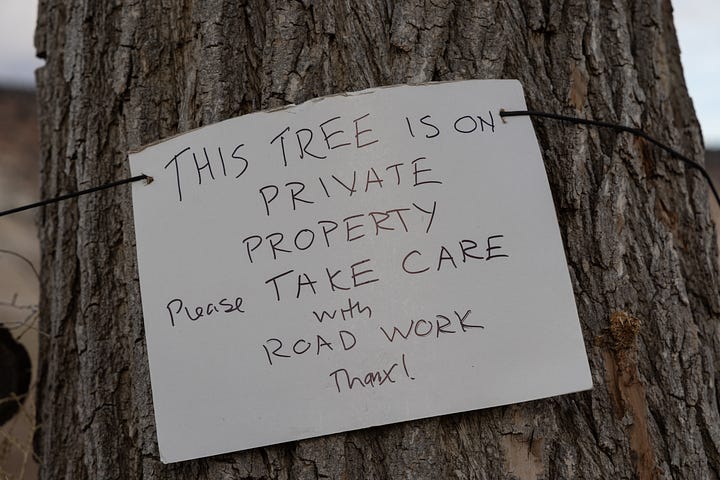
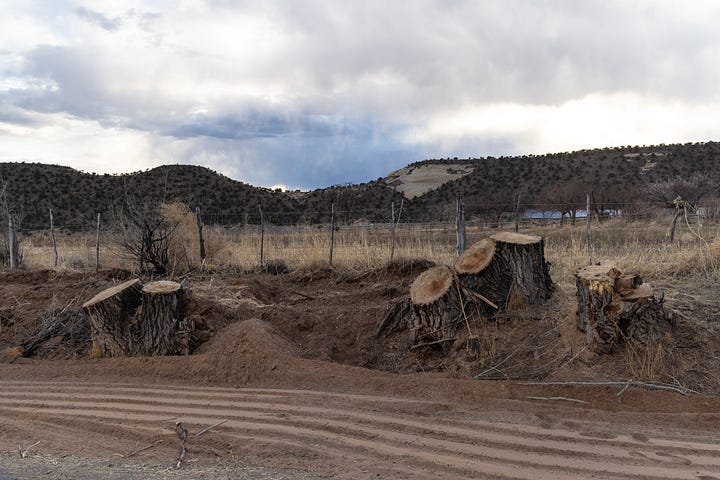
Many people who live along the road are devastated and heart-broken. There is nothing to be done for the trees that have already been cut, for the limbs already lost. I was so distressed last night that I couldn’t sleep. I went for a walk under the stars and felt a sinking well of hopelessness despite the beauty above. This morning, a group of neighbors went out to stand vigil and protect the remaining tree. A town council member showed up, and eventually it was concluded that the tree would be left alone. I breathed a sigh of relief. I know this might seem like a small thing, but with all the chaos in the wider world, until last week I felt that I at least had this place, this haven, to feel safe and to balance and support myself as I face the calamities of the nation and the planet.
Soon after I learned the tree had been saved, I got a message that one of our close family friends had been brought home on hospice care. He’s had increasing symptoms of cognitive decline for the past few years but has refused to get help or treatment or to leave his mountain home. It’s been a difficult time for his family and those close to him. I’ve known him since I was born. Our families celebrated every holiday together, carpooled to school, did river trips in the Western U.S. and even traveled to China to raft the Yangtze when their daughter and I were in middle school. He taught me to forage mushrooms in the forest around our homes and was the best cook I knew. We have spent so much of life closely intertwined.
Last week he fell and hit his head. He spent a week in the hospital and then went home on hospice with a traumatic brain injury, life waning. With all the complications of the past few years, I felt confused about how to deal with this tragedy. Should I make the 4 hour drive? If it had been 10 years ago, I definitely would’ve felt the need to be there and say goodbye. And when I felt into it, I realized I still need to go. Despite difficult years, he has been a huge part of my life. I want to be there, to squeeze his hand, to hug his daughter and wife, to be together. Even if he doesn’t consciously know I’m there. Sadly he passed before I could get there. But I was able to share meaningful time with his family and mine, recounting stories, laughing, crying, and looking at photographs of him skiing with a huge smile on his face.
Soon after getting the news about his fall, I learned that 3 people in the wider snow community had died in an avalanche. I didn’t know any of them personally, but probably half the people I know knew them. Since my friend Kasha’s avalanche accident last year, and even before that, as people I knew more distantly were killed by avalanches, I’ve been more and more deeply affected by these deaths. It’s like each one rips the scab off the wound and digs it a little deeper. Reading about one of the men's wives' digging him out of the snow and trying to revive him before going home to their young son broke my heart. Tears streamed for these people I don't know, but in some way, feel I do, because our lives have been on parallel tracks. Although I haven’t skied in the backcountry for several years now due to illness, it was still the main driving force in my life for so many years, it is still my community, and it still hurts. It scares me to know that these people were some of the most knowledgeable and practiced people in their profession, and that they were still taken.
It’s hard not to think: it could’ve been me. It could’ve been my close friends. It could’ve been my partner, whose decision-making I trust more than anyone’s, but who is out skiing in the backcountry most days during the winter. I know they are called accidents for a reason: because you don't expect them to happen. Our community has had so many losses in the last two years. To me, it seems like there’s been a spike in avalanche accidents recently, or at least the ones that hit closer to my heart. And they just. keep. coming.
I have come to understand that grief is a function of love, that they are directly related, and my deep relationship with grief means that I love so, so much. But some weeks are just a ‘cauldron of sorrow’ as my friend Sara called it. Sorrow after sorrow piles in. The country is a fucking mess. My home state of Utah is a fucking mess (hello, banned pride flags in schools and government buildings, mandated curriculum changes for higher education to highlight the rise of Christianity, unchecked environmental destruction, Planned Parenthood closures, it goes on and on…)
Some days, we get battered. When I was on the phone with Sara, sharing my day's tears, she brought up the ongoing work of learning to live with grief, of how we can try to make a container, a space to hold it, so that perhaps, if we’re lucky, it doesn’t overflow and take over our entire lives (although sometimes it does, and that’s okay too). We talked about the shared experience of these hard things showing up at bedtime to whirl us into worry and sorrow and overwhelm, to keep us in the liminality of fear when it's dark and pulling out of its grasp is harder. Instead, we are each trying to make time for grief during the daylight hours. To sit with it, walk with it, talk with it, feel it.
People keep falling into the cauldron of sorrow, but also, the daffodils are blooming, the garlic is sending up green shoots, and the birds are returning from their migrations for another summer in the desert southwest. Another teacher reminded me of the Buddhist teaching of ten thousand sorrows and ten thousand joys. Although some life chapters may seem to lean more towards one or the other, I know that life is always a mix of both.
I planted seeds for food and flowers this afternoon as I cried. I watched an ermine leap through the orchard, hopefully hunting gophers for lunch. The birds sang. Sara reflected, “I think to consider: what do I still have and how much can I love it?” I love all of this, everything I can see, so very much. I talked about the fact that as I was brushing my teeth earlier this week, the thought hit me that I really love my life. I am in the process of truly coming to love this (gestures around). This felt huge because I didn’t think I’d ever feel this way as long as I was sick, but here I am. I am happy (not everyday, but at least some!) with my silversmithing and reading and writing and slow walks and gardening and friends and dogs and loved ones. Do I wish I felt better more often? Definitely. But it is so relieving to know that I can enjoy this life I have right now. And that sometimes I will be bowled over by grief. We don’t get to choose that, but we can feel it, and be there for the people we care about, and share our deepest love with the world around us.
Thanks for being here! Every like, comment, or interaction means so much to me ✨




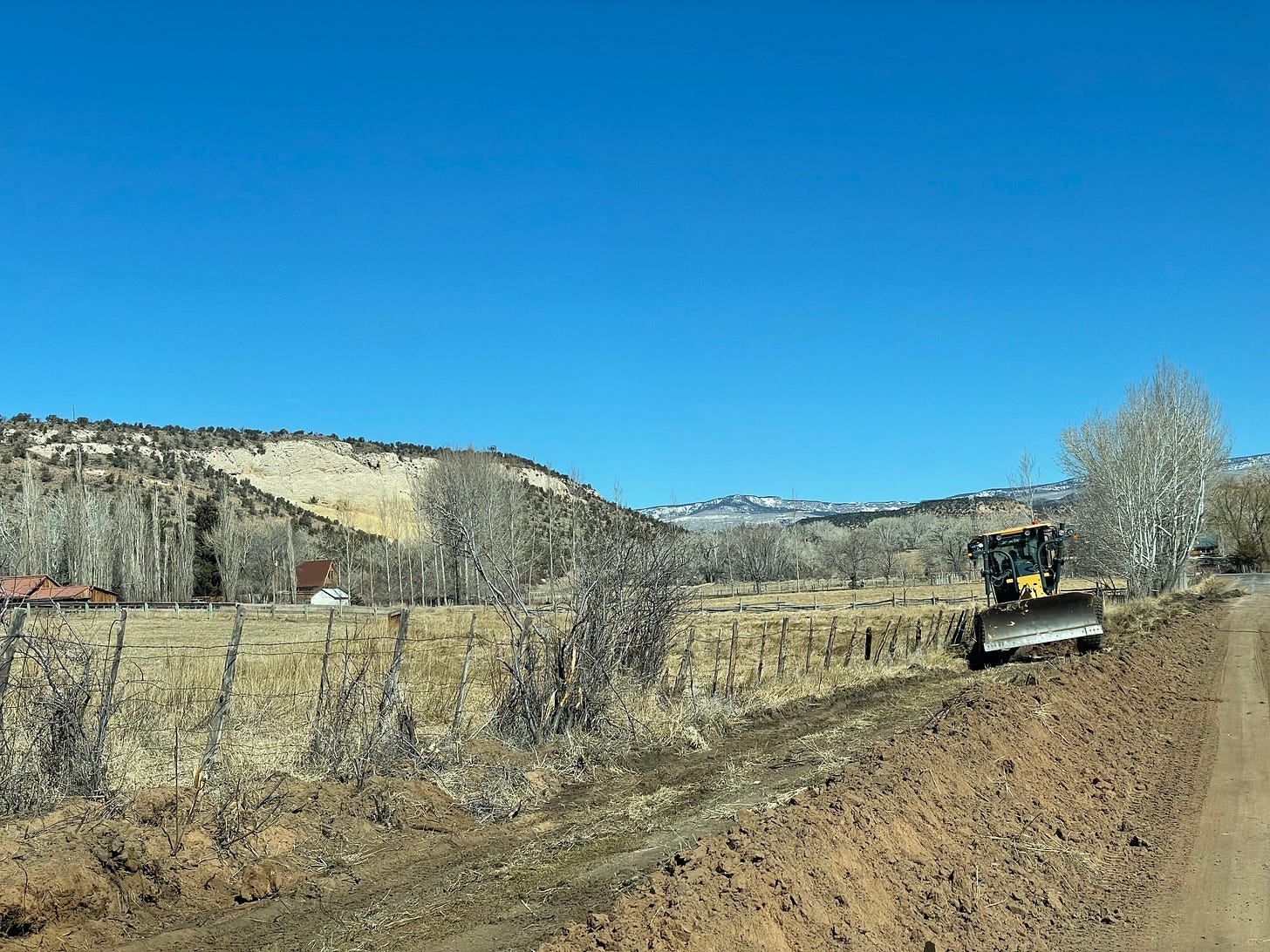
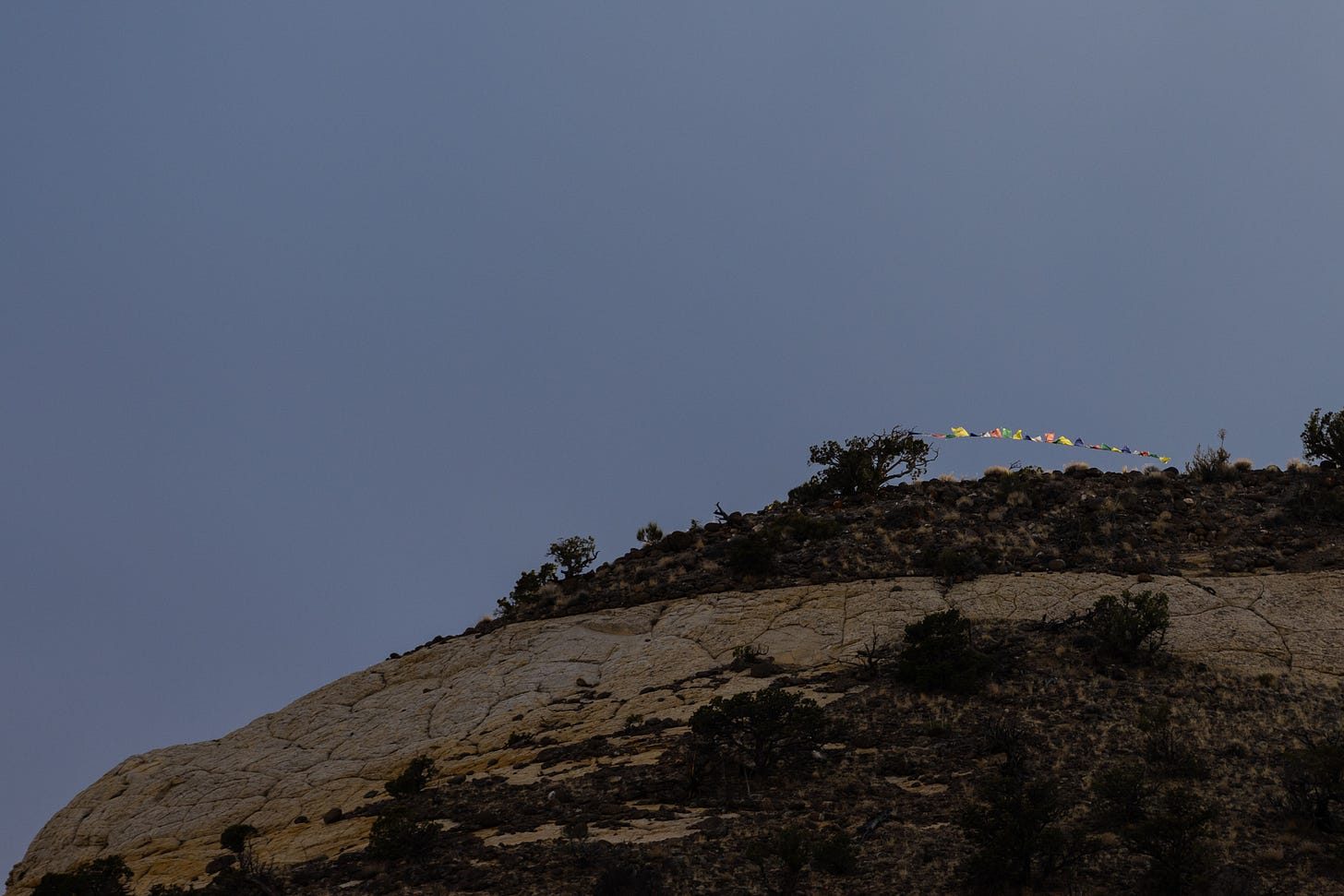
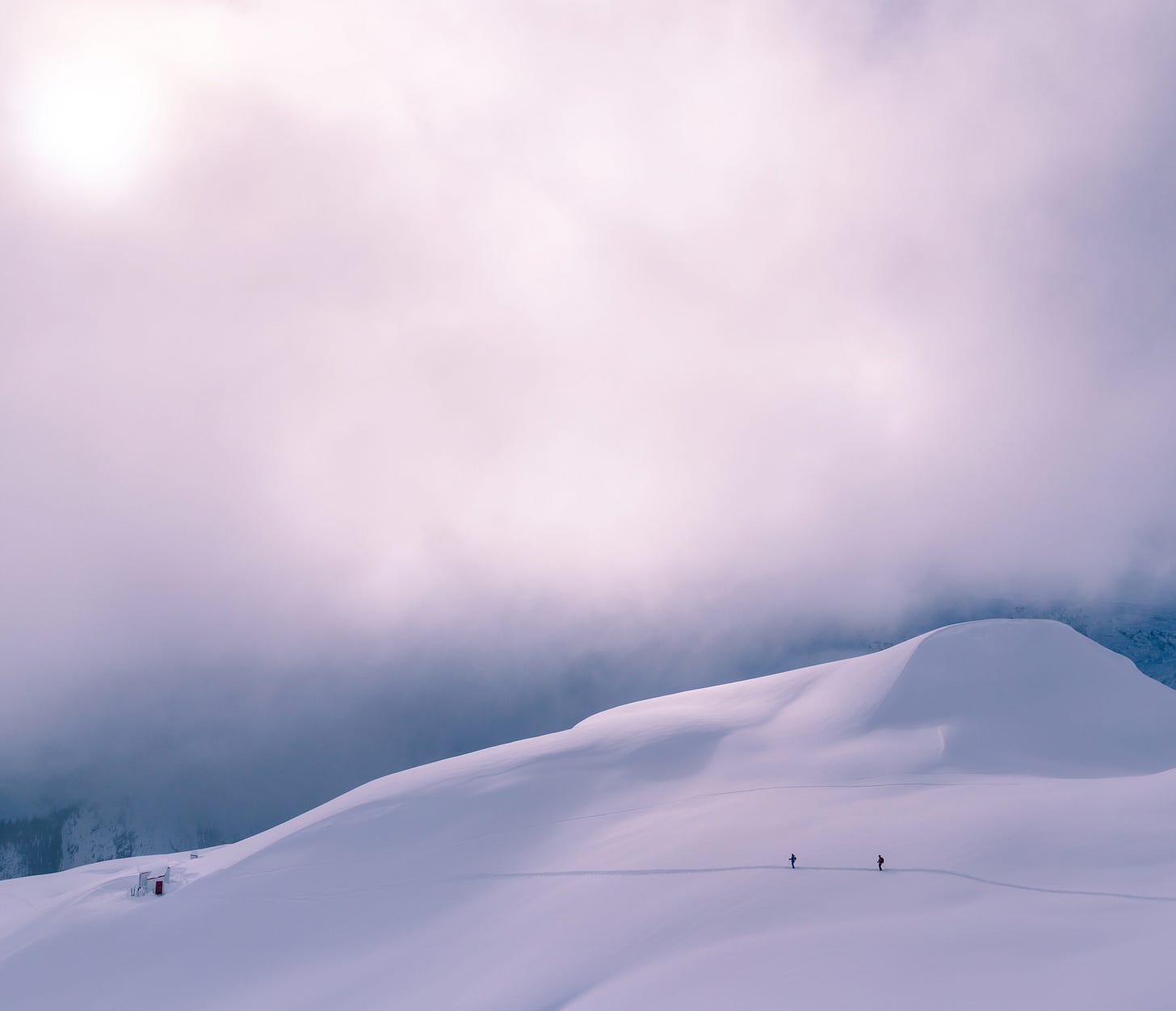
Oh my God I'm so sorry about the trees in Boulder! Mary this is so lovely and so real. These are polarizing times for sure. My favorite line from this "what do I still have and how much can I love it?” 💗💗💗
Dear Mary, I'm so very moved by your Cauldron of Sorrow writing. Touches my heart deeply. There's so much to feel and reflect on here. Trying to save the trees! A few weeks ago, a neighbor of a few years on the corner of our block where we've lived for 32 years, had five old, olive trees mercilessly taken down in his side yard.. There was no warning. These trees were heritage trees and could have been easily a hundred years old or more, planted by the Italian Luchese immigrants in our town. My family cried and grieved at their loss. There is a painful emptiness on the corner. These moments and times of grief and loss are as meaningful to our humanity as those times of beauty and celebration. Thank you for telling your stories and bringing us the full arc of emotional experience. Blessing and love, Phyllis